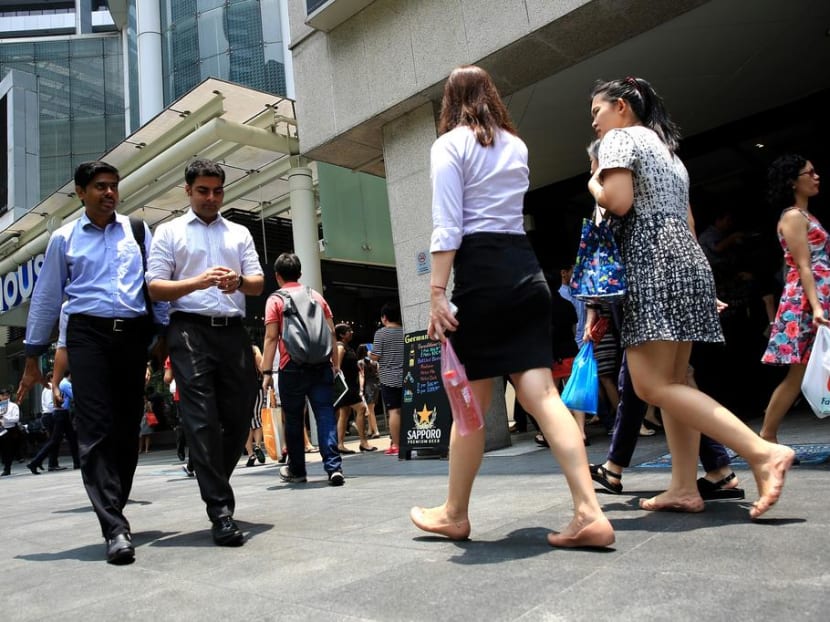Singaporean workers’ salaries to rise at a slightly slower pace in 2020: Report
SINGAPORE — The salaries of Singaporean workers will rise a little less next year than they did this year, but workers here will still do better than their counterparts in several regional markets, a new report has found.

After taking inflation into account, workers in Singapore can expect an average salary increase of 3 per cent in 2020, a new report said.
SINGAPORE — The salaries of Singaporean workers will rise a little less next year than they did this year, but workers here will still do better than their counterparts in several regional markets, a new report has found.
The annual Salary Trends Report, released on Monday (Nov 11) by global data and research house ECA International, showed that the average real salary rise for Singaporean workers in 2020 is projected to be 3 per cent — down from 3.3 per cent this year.
The average increase for Singapore is calculated after taking 1 per cent inflation into account. It projects an average 4 per cent rise in average salaries in dollar or “nominal” terms, but the “real” increase is 3 per cent as the cost of living is set to rise 1 per cent.
The forecasts are based on data collected during August and September by ECA International from 307 multinational companies across all major sectors of 68 countries, including Singapore. The projected wage rises include increases for merit.
The survey reports current-year salary increases for employees of the country and the anticipated increases from reviews in the forthcoming year.
Mr Lee Quane, regional director of Asia at ECA International, said that despite the slightly weaker salary growth in Singapore next year, the increase will still be larger than neighbouring markets such as Hong Kong with a 1.4 per cent average increase in real terms, Taiwan at 2.6 per cent and Japan 1 per cent.
The global average salary increase in real terms for 2020 is 1.4 per cent.
“The notably low level of inflation that Singapore has seen over the recent years, coupled with a tight labour supply and talent restrictions due to immigration constraints, implies that salary increases will remain relatively high,” he added.
The report also found that Asian countries have lead the way again for salary increases, with 13 out of the top 20 increases worldwide in real salaries recorded in Asia.
Asian countries occupy the top five spots in global rankings for forecasted real-salary increases next year:
India with 5.4 per cent
Vietnam with 5.1 per cent
Indonesia with 4.6 per cent
Cambodia with 4.2 per cent
Thailand with 4.1 per cent.
Mr Quane said that the average real-salary increase in the Asia-Pacific region, at 3.2 per cent, is significantly higher than the global average of 1.4 per cent and nearly thrice the European average at 1.1 per cent.
“This is a trend that we have seen for many years now due to low inflation and rising productivity in many Asian economies, resulting in the rapid growth of salaries compared to other regions.”
Vietnam and Thailand both saw significant real-salary increases and were placed in the global top five.
This has been a long-term trend for both countries as productivity continues to grow and inflation is controlled, Mr Quane said.
“Workers in Vietnam and Thailand will both see further increases to their salaries, as the nominal salaries expected to be given by employers stay well ahead of the low levels of inflation that these countries will see in 2020.”
However, not all Asian economies will benefit from an average salary rise after inflation. For instance, workers in Malaysia can expect to see a marked drop in their real-salary increases to 2.9 per cent in 2020, down from 4 per cent this year.
Mr Quane said: “Despite the forecasted nominal salary increase staying at 5 per cent, inflation in Malaysia is expected to rise from 1 per cent to 2.1 per cent which will reduce the rate at which salaries increase in real terms for workers in the country.
“Although it is still relatively high, the predicted lower real-salary rise for workers compared to 2019 has seen Malaysia drop out of the global and Asia Pacific’s top 10.”
Join our Telegram channel to get TODAY's top stories on mobile:

*TODAY's WhatsApp news service will cease from November 30, 2019.
Hong Kong will see a higher salary increase next year, but is still among the lowest in Asia.
Workers in Hong Kong will see an average increase of 1.4 per cent, after factoring in forecast inflation of 2.6 per cent, representing one of the lowest increases in the region.
“This underlines the fact that many companies in Hong Kong need to continue to attract and retain staff even in this period of economic adversity for the city,” Mr Quane said.








